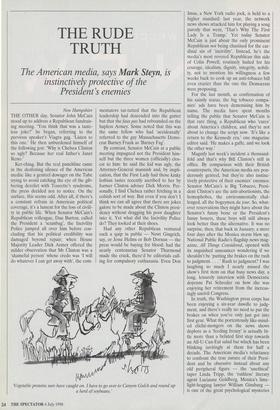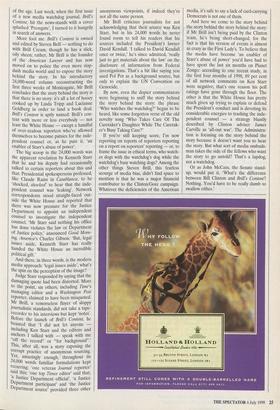THE RUDE TRUTH
The American media, says Mark Steyn, is
instinctively protective of the President's enemies
New Hampshire THE OTHER day, Senator John McCain stood up to address a Republican fundrais- ing meeting. 'You think that was a taste- less joke?' he began, referring to the previous speaker's Viagra gag. 'Listen to this one.' He then unburdened himself of the following jest: 'Why is Chelsea Clinton so ugly? Because her real father's Janet Reno.'
Ker-ching. But the real punchline came in the deafening silence of the American media: like a genteel dowager on the Tube trying to avoid catching the eye of the gib- bering derelict with Tourette's syndrome, the press decided not to notice. On the surface, this seems odd. After all, if there's a constant refrain in American political coverage, it's a lament for the loss of civili- ty in public life. When Senator McCain's Republican colleague, Dan Burton, called the President a `scumbag', the Incivility Police jumped all over him before con- cluding that his political credibility was damaged beyond repair; when House Majority Leader Dick Armey offered the milder observation that Mr Clinton was a `shameful person' whose credo was 'I will do whatever I can get away with', the com- mentators tut-tutted that the Republican leadership had descended into the gutter but that the faux pas had rebounded on the hapless Armey. Some noted that this was the same fellow who had 'accidentally' referred to the gay Massachusetts Demo- crat Barney Frank as 'Barney Fag'.
By contrast, Senator McCain at a public meeting impugned not the President him- self but the three women (officially) clos- est to him: he said the kid was ugly, the Attorney-General mannish and, by impli- cation, that the First Lady had those kinky lesbian tastes recently ascribed to her by former Clinton adviser Dick Morris. Per- sonally, I find Chelsea rather fetching in a coltish sort of way. But even if you don't I think we can all agree that there are jokes galore to be made about the Clinton presi- dency without dragging his poor daughter into it. Yet what did the Incivility Police do? They looked at their shoes.
Had any other Republican ventured such a quip in public — Newt Gingrich, say, or Jesse Helms or Bob Dornan — the press would be baying for blood; had the nearly centenarian Senator Thurmond made the crack, there'd be editorials call- ing for compulsory euthanasia. Even Don `Vegetable proteins sure have caught on. I have to go over to Canyon Gulch and round up a herd of soybeans.' Imus, a New York radio jock, is held to a higher standard: last year, the network news shows attacked him for playing a song parody that went, 'That's Why The First Lady Is a Tramp.' Yet today Senator McCain is just about the only prominent Republican not being chastised for the car- dinal sin of 'incivility'. Instead, he's the media's most revered Republican this side of Colin Powell, routinely hailed for his courage, idealism, dignity, integrity, nobili- ty, not to mention his willingness a few weeks back to cook up an anti-tobacco bill even crazier than the one the Democrats were proposing.
For the last month, as confirmation of his saintly status, the big tobacco compa- nies' ads have been demonising him by name. The media have spent months telling the public that Senator McCain is that rare thing, a Republican who 'cares' about America's children, and they're not about to change the script now. 'It's like a return to the Kennedy era,' one magazine editor said. 'He makes a gaffe, and we look the other way.'
Magnify last week's incident a thousand- fold and that's why Bill Clinton's still in office. By comparison with their British counterparts, the American media are pon- derously genteel, but they're also instinc- tively protective of their enemies' enemies: Senator McCain's is Big Tobacco, Presi- dent Clinton's are the anti-abortionists, the homophobes, the environmentally chal- lenged, all the bogeymen du jour. So, what- ever reservations they might have about the Senator's funny bone or the President's funny boners, these boys will still always look better than the alternative. It was no surprise, then, that back in January, a mere four days after the Monica storm blew up, National Public Radio's flagship news mag- azine, All Things Considered, opened with its anguished announcer wondering if we shouldn't be 'putting the brakes on the rush to judgment. . . . ' Rush to judgment? I was laughing so much I nearly missed the show's first item on that busy news day, a long, leisurely interview with Democratic doyenne Pat Schroder on how she was enjoying her retirement from the increas- ingly uncivil Congress.
In truth, the Washington press corps has been enjoying a six-year dawdle to judg- ment, and there's really no need to put the brakes on when you've only just got into first gear. What the portentously like-mind- ed cliché-mongers on the news shows deplore as a 'feeding frenzy' is actually lit- tle more than a belated first step towards an All-U-Can-Eat salad bar which has been blinking invitingly at them for half a decade. The American media's reluctance to confront the true nature of their Presi- dent and be obsessive instead about any old peripheral figure — the 'unethical' taper Linda Tripp, the 'ruthless' literary agent Lucianne Goldberg, Monica's lime- light-hogging lawyer William Ginsburg is one of the great psychological mysteries of the age. Last week, when the first issue of a new media watchdog journal, Brill's Content, hit the news-stands with a cover splashed Pressgate', I turned to it hungrily in search of answers.
More fool me. Brill's Content is owned and edited by Steven Brill — nothing to do with Brill Cream, though he has a slick, oily sheen; rather, Mr Brill is the founder of the American Lawyer and has now moved on to police the even more slap- dash media world and to expose the story behind the story. In his introductory 24,000-word column reconstructing the first three weeks of Monicagate, Mr Brill concludes that the story behind the story is that there is no story: it's all a lot of hooey cooked up by Linda Tripp and Lucianne Goldberg in order to land a book deal. Brill's Content is aptly named: Brill's con- tent with more or less everybody — not least the White House — except a handful of over-zealous reporters who've allowed themselves to become patsies for the inde- pendent counsel or, as he puts it, 'an enabler of Starr's abuse of power'.
The big scoop in the 24,000 words was the apparent revelation by Kenneth Starr that he and his deputy had occasionally talked to certain reporters about this and that. Presidential spokespersons professed, like Claude Rains in Casablanca, to be `shocked, shocked' to hear that the inde- pendent counsel was 'leaking'. Network correspondents stood straight-faced out- side the White House and reported that there was now pressure for the Justice Department to appoint an independent counsel to investigate the independent counsel. 'Mr Starr said nothing his office has done violates the law or Department of Justice policy,' announced Good Morn- ing America's Charles Gibson. 'But, legal issues aside, Kenneth Starr has really handed the White House an incredible political gift.' And there, in three words, is the modern media approach: 'legal issues aside', what's the spin on the perception of the image? Judge Starr responded by saying that the damaging quote had been distorted. More to the point, six others, including Time's managing editor and a Washington Post reporter, claimed to have been misquoted. Mr Brill, a remorseless flayer of sloppy journalistic standards, did not take a tape- recorder to his interviews but kept `notes'. Before the launch of Brill's Content, he boasted that 'I did not let anyone including Ken Starr and the editors and anchors I talked with — speak with me off the record" or -"for background".' This, after all was a story exposing the corrupt practice of anonymous sourcing. Yet, amazingly enough, throughout its 24,000 words familiar formulations kept recurring: 'one veteran Journal reporter' said this; 'one top Times editor' said that; a Justice Department official', 'a Justice Departmentparticipant' and 'the Justice Department source' provided three other anonymous viewpoints, if indeed they're not all the same person.
Mr Brill criticises journalists for not acknowledging that their source was Ken Starr, but in his 24,000 words he never found room to tell his readers that his sources included the President's lawyer David Kendall. 'I talked to David Kendall once or twice,' he's since admitted, 'really just to get materials about the law' on the disclosure of information from Federal investigations. That's a bit like saying you used Pol Pot as a background source, but only to explain the UN Convention on Genocide.
By now, even the dopier commentators were beginning to sniff the story behind the story behind the story: the phrase `Who watches the watchdog?' began to be heard, like some forgotten verse of the old novelty song 'Who Takes Care Of The Caretaker's Daughter While The Caretak- er's Busy Taking Care?'
If you're still keeping score, I'm now reporting on reports of reporters reporting on a report on reporters' reporting — or, to frame the issue in ethical terms, who watch- es dogs with the watchdog's dog while the watchdog's busy watching dogs? Among the other things Steven Brill, this fearless scourge of media bias, didn't find space to mention is that he was a major financial contributor to the Clinton/Gore campaign. Whatever the deficiencies of the American media, it's safe to say a lack of card-carrying Democrats is not one of them.
And here we come to the story behind the story behind the story behind the story: if Mr Brill isn't being paid by the Clinton team, he's being short-changed, for the fact is that his version of events is almost as crazy as the First Lady's. To believe that the media have become 'an enabler of Starr's abuse of power' you'd have had to have spent the last six months on Planet Zongo: according to one recent study, in the first four months of 1998, 89 per cent of all network comments on Ken Starr were negative; that's one reason his poll ratings have gone through the floor. The other is that the White House has pretty much given up trying to explain or defend the President's conduct and is devoting its considerable energies to trashing the inde- pendent counsel — a strategy bluntly described by Clinton adviser James Carville as `all-out war'. The Administra- tion is focusing on the story behind the story because it doesn't want you to hear the story. But what sort of media ombuds- man takes the side of the fellows who want the story to go untold? That's a lapdog, not a watchdog.
Or as John McCain, the Senate stand- up, would put it, 'What's the difference between Bill Clinton and Brill's Content? Nothing. You'd have to be really dumb to swallow either.'















































































































 Previous page
Previous page